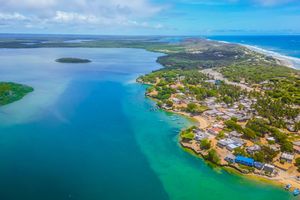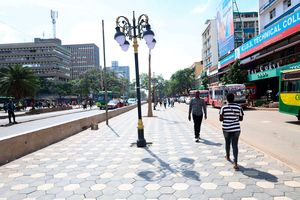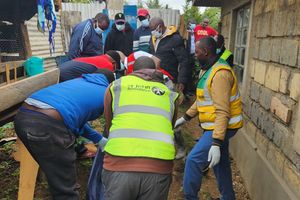
Gavel.
A birth certificate and Identity Card (ID) proved vital for a man who has won a protracted case for his father’s estate against his relatives.
Armed with just a birth certificate, ID and few witnesses, including his grandfather, a 39-year-old man has reclaimed and inherited his deceased father’s property despite opposition from relatives.
The battle for the inheritance emerged when the relatives claimed he was not their brother’s biological son.
Moses Mwambewa has been in court since 2009, battling his father’s relatives for a share of the deceased’s property, which nearly slipped away from him had he not acted swiftly to block the issuance of ownership documents to them.
Mr Mwambewa can now breathe easy after the Family Court in Mombasa County opposed the claims that he was not Jacob Mwalekwa’s biological son and issued him documents to manage the deceased's estate.
“Having found that the objector (Mwambewa) is a rightful beneficiary of the deceased estate, being a child of the deceased, it is my view that he is qualified to be an administrator and that he is also the most suitable person to administer the estate,” said Justice Gregory Mutai in a judgment delivered on July 22.
Justice Mutai declared that the deceased's relatives, Kasian Keke and Matunda Kiwo, who had petitioned for the issuance of the documents, are not the beneficiaries of the estate, as the deceased had a child, Mwambewa.
“In the interest of justice, I hereby appoint him (Mwambewa) as an administrator of the deceased estate and direct that letters of administration intestate be issued to him forthwith,” said Justice Mutai.
Mr Keke and Ms Kiwo filed a petition in 2009 to obtain the documents necessary to administer his estate, but Mr Mwambewa became aware of it and objected, asserting that he was the deceased's son and thus the rightful person to be issued the documents.
The objector stated that he was the deceased's biological son and presented his birth certificate and ID.
“My parents got married in 1984, and I was born the following year in February. I lived with my parents at Kwa Hola on my father’s plot,” he said through CA Odhiang & Co. Advocates.
He mentioned that his parents separated in 1995, but he continued to live with his father in Kwa Hola but used to visit his mother. He said the deceased provided for all his needs, including school fees and medical expenses.
He further testified that he would visit his father from time to time even after he moved out of their home. He added that he was not present when the deceased passed away, as he was in Lamu.
“I have a right to inherit from my father’s estate,” he said.
To support his case, the objector called three witnesses, including his grandfather, Mzae Mwawase, who backed his claim, stating that the deceased married his daughter in October 1984 under Taita Customary Law and paid the bride price according to community customs.
“He then took her to his home and later to Mombasa, where they operated a business,” he said.
This elderly man also presented an exercise book in court that recorded the proceedings regarding the payment of the bride price.
Mr Mwawase mentioned that her daughter’s union with the deceased was blessed with a son (the objector).
“However, at the time of marriage, my daughter had two children out of wedlock, a boy and a girl, whom the deceased accepted as his own,” he said, adding that a family feud arose after Mwalekwa’s death leading to the objector’s mother being chased away.
“My daughter and the deceased were separated by death. My daughter never remarried,” he said.
The deceased's cousins, John Mwangecho and Scholastica Mghoi, also backed the objector’s claim noting that the deceased had previously married four wives before finally marrying the objector’s mother.
“They were blessed with a son (the objector) in 1985, a fact known to the family,” said Mwangecho, who added that the deceased left behind three properties in Mombasa, Taita, and Taveta, which should be handed over to his son.
Mr Keke and his witnesses stood their ground that the objector’s mother entered the marriage with three children, including the objector himself, who was three months old at the time and was not blessed with a child.
“They parted ways in 1993 after a forceful eviction from the house by the deceased,” he said.
He stated that the deceased, in 2008, appointed him and his sister Kiwo as the administrators of all his properties in the event of his death after he was involved in an accident.
Mr Keke also explained that he settled his nephew’s arrears at the defunct Mombasa Municipal Council of Sh64, 000 after his burial.
“The objector is not the deceased's son; he came with his mother at the age of three months. The two birth certificates produced are different and do not clearly indicate which one is genuine. Both the birth certificates and identity card are forged,” he said.
He noted that many details, including the location and sub-location on the objector’s identity card, differ from those of the deceased, therefore he has no right to inherit from the deceased as he is not his son.
Additionally, he mentioned that he took all the items from the deceased’s house to a rural home in Taita and that he had everything the deceased possessed.
Through Munyithya, Mutugi Umara & Muzna Co Advocates, the petitioners argued that the objector refused to submit to a DNA test, which indicated that he feared being exposed for lying to the court about being the son of the deceased.
Peter Mutau from the Office of Registrar of Births and Deaths testified that he received a letter to compare two birth certificates with different serial numbers.
He confirmed that the two certificates are genuine as they were registered by a Register of Birth from Changamwe Maternity Hospital.
“Three birth certificates were issued in this case, and there was no change of particulars except the serial numbers. The certificates were issued in 1986, 2010, and 2017. Serial numbers differ from certificate to certificate and that does not mean that there is forgery,” he said.
In the end, Justice Mutai concluded that the objector’s evidence was corroborated by that of his third and fourth witness, who testified that he was the deceased son, born during the subsistence of the deceased marriage with his mother.
“Mr Mutau confirmed the authenticity of the birth certificates the objector produced before the court. Although birth certificates are not conclusive proof of paternity, they are prima facie evidence of it,” said the judge.
He concluded that witnesses’ evidence, when taken together with the birth certificate, leads him to the conclusion that, indeed, the objector was the deceased son.












